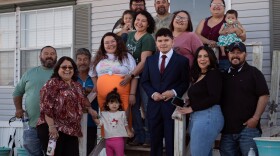
Michaeleen Doucleff
Michaeleen Doucleff, PhD, is a correspondent for NPR's Science Desk. For nearly a decade, she has been reporting for the radio and the web for NPR's global health outlet, Goats and Soda. Doucleff focuses on disease outbreaks, cross-cultural parenting, and women and children's health.
In 2014, Doucleff was part of the team that earned a George Foster Peabody award for its coverage of the Ebola outbreak in West Africa. For the series, Doucleff reported on how the epidemic ravaged maternal health and how the virus spreads through the air. In 2019, Doucleff and Senior Producer Jane Greenhalgh produced a story about how Inuit parents teach children to control their anger. That story was the most popular one on NPR.org for the year; altogether readers have spent more than 16 years worth of time reading it.
In 2021, Doucleff published a book, called Hunt, Gather, Parent, stemming from her reporting at NPR. That book became a New York Times bestseller.
Before coming to NPR in 2012, Doucleff was an editor at the journal Cell, where she wrote about the science behind pop culture. Doucleff has a bachelor degree in biology from Caltech, a doctorate in physical chemistry from the University of Berkeley, California, and a master's degree in viticulture and enology from the University of California, Davis.
-
After a meal some people experience high spikes in blood sugar followed by a crashing low. The dips can cause fatigue, moodiness and lead to overeating. Learning how to manage your blood sugar can help.
-
A continuous glucose monitor is a small device that sticks to your arm. Every few minutes it sends a signal to your phone estimating your blood sugar levels. But can it improve your health?
-
When it comes to rice and pasta, dieticians recommend eating brown or whole grain because they're more nutritious. But you can create a super nutrient in white rice and white pasta.
-
Not motivated to get to the gym? NPR’s Michaeleen Doucleff explores how functional exercise, such as gardening or taking care of chickens, racks up steps and squats.
-
Going to the gym is a great way to get exercise — once you get into your gym duds and motivate yourself to start working out. But in other parts of the world, there's a different way to stay fit.
-
Over the past few decades, psychologists have begun to understand how parents across many cultures teach their children to build deep, fulfilling relationships with their siblings.
-
Kids have too much screen time and not enough autonomy, says author Jonathan Haidt. His book The Anxious Generation argues this has caused an epidemic of mental illness and suggests ways to fix it.
-
A case in Oregon is a rarity in the United States. It is not expected to spread. But this ancient and deadly disease remains a threat around the world.
-
"Allo" is Greek for "other." Alloparents are helpful relatives and neighbors. In a study from Congo, babies had 8 alloparents on average. Perhaps the self-reliant nuclear family is a societal misstep.
-
Allo parenting, in which non-biologic parents serve as a child's caregiver, is common in many parts of the world. Mothers have help provided by several others, including neighbors and older siblings.






